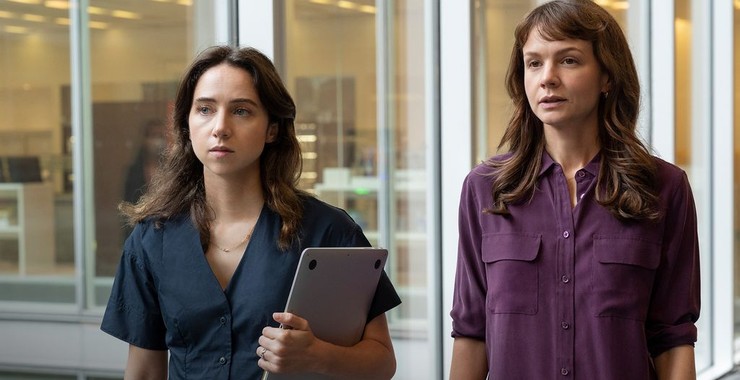
The investigation into the behavior of legendary, and now infamous, Hollywood producer Harvey Weinstein marked the beginning of a seismic shift in how the country addressed sexual harassment and misconduct. A new film sets to document the journey toward exposing his behavior and the systemic mistreatment of women in Hollywood. She Said is the retelling of the investigation by New York Times journalists Megan Twohey (Carey Mulligan) and Jodi Kantor (Zoe Kazan) into sexual abuse allegations against powerful Hollywood producer Harvey Weinstein, the impetus for the #MeToo movement.
The obvious comparison for She Said, and one that many viewers are sure to make, is with 2015 Best Picture winner Spotlight, another film that covered a newspaper’s investigative reporting into a sex scandal, this time the Boston Globe and child sex abuse within the Boston Archdiocese. While both films have a similar feel as we track reporters doggedly looking into systemic abuse and widespread coverup, where She Said diverges from its predecessor is its focus on the procedural aspect of investigative reporting as opposed to a deep dive into the mindset and relationships of its characters. To use a TV reference, think of it as the difference between Law & Order and Law & Order: Special Victims Unit. Whereas Spotlight spent time concurrently following the investigation and its mental effects on the reporters, this film is a step-by-step breakdown and thorough examination of systemic abuse with less time spent in the minds of its characters.
The audience journeys alongside Megan and Jodi as they investigate Weinstein from beginning to end, with the film immediately establishing the context of initial spark for the #MeToo movement as we see what Megan experienced in the leadup to the 2016 election of former President Donald Trump and her involvement in reporting on his sexual misconduct allegations. From there we see the genesis of the investigation into Weinstein’s misdeeds from Jodi’s initial lead to her beginning to track down potential witnesses and their stories and the development from there into a full fledged potential story. It sounds a bit by the numbers and while it is, Maria Schrader’s direction and Rebecca Lenkiewicz’s writing are strong enough to where it is compelling throughout as we follow the leads and become invested in the intrepid reporters breaking through the culture of silence and intimidation to reach the truth and bring it into the light. This achievement is additionally notable since everyone watching is aware of the ultimate outcome and conclusion, but enthralled anyway.
What compliments the writing in enticing the audience despite the reasons for them to disengage is how well Schrader succeeds in fostering empathy for the women and their experiences through various means. The first and most obvious would of course be her direction of She Said’s actors, as Angela Yeoh, Jennifer Ehle, and most notably Samantha Morton’s Zelda Perkins portray scarred, hesitant, but ultimately strong women who are dealing with the consequences and scarring of mistreatment. Their stories and the effects on their lives make them sympathetic figures who the audience becomes determined to root for and see make it out ok in the end. In addition to the performances, Schrader made the interesting creative choice to play a recording of Weinstein’s inappropriate coercion of an aspiring actress into sleeping with him in order to receive his professional assistance. The recording provides a visceral example for the audience of just what the real women whom these fictionalized versions are portraying faced in real life and how harrowing of an experience it was. It makes everything feel real and thus, hooks the audience into this ride until the end.
She Said is a thorough examination of the machinations of systemic misconduct and abuse and the investigatory reporting needed to uncover it all. Carey Mulligan and Zoe Kazan perform capably, but this film is all about how the plot unfolds and how the intrepid reporters uncover the truth and present it to the public. Despite its procedural nature, the film is engaging and well paced, a quality watch and documentation of a major news story. All in all, it’s an interesting watch that covers the social aspects and impact of the Weinstein saga well.
Image: Universal Pictures

